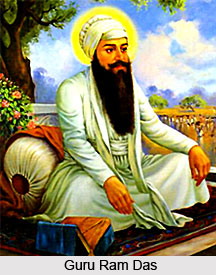 Guru Ram Das was the fourth guru of the Sikhs. He is also revered as the Chauthi Patshahi by the Sikhs. He had succeeded his father-in-law Guru Amar Das on 30th of August, 1574 as the fourth guru of the Sikhs. Guru Ram Das was born in Lahore to a Sodhi family of the Khatri clan on 24th of September 1534. He was born to Hari Das and Anupa Devi. In his early life Ram Das was known as Jetha because he was the first child to his parents.
Guru Ram Das was the fourth guru of the Sikhs. He is also revered as the Chauthi Patshahi by the Sikhs. He had succeeded his father-in-law Guru Amar Das on 30th of August, 1574 as the fourth guru of the Sikhs. Guru Ram Das was born in Lahore to a Sodhi family of the Khatri clan on 24th of September 1534. He was born to Hari Das and Anupa Devi. In his early life Ram Das was known as Jetha because he was the first child to his parents.
History says that once Jetha met a party of Sikh followers who were going to Goindwal to offer homage to Guru Amar Das. On meeting them, Jetha at once decided to join the party in order to pay respect to Guru Amar Das. As the party arrived to Goindwal, Jetha soon impressed Guru Amar Das with his humble manners and dedication to the Lord. The party with whom Jetha had arrived returned but he stayed back because he wanted to serve the Guru. Very soon Guru Amar Das was pleased with Jetha"s hard work and devotion and as a reward he married his younger daughter Bibi Bhani to Jetha.
Gradually Jetha became the most trusted disciple of Guru Amar Das and after the demise of Guru Amar Das, Jetha was made the fourth guru of the Sikhs and was named Guru Ram Das. On becoming the guru, Guru Ram Das seriously engaged himself in the establishment of the city of Ramdaspur. As instructed by Guru Amar Das, Ram Das also continued to dig a holy pool in the city of Ramdaspur. Lot of devotees gathered in Ramdaspur during this time in order to hear from the guru and also to help him to dig the sacred pool. The pool came to be known as Amritsar, meaning a pool of nectar. Presently the city of Ramdaspur is known as Amritsar and stands as the holiest city for all the Sikhs. An important contribution of Guru Ram Das to the Sikhs was that he organised the Sikh society. He is also known as the author of Laava and several numbers of hymns related to the rites of marriage. Guru Ram Das had also designed the Harmandir Sahib. Guru Ram Das told his followers that mere meditation in the recluse is not enough to merge with the Almighty. A true devotee should actively relate to the joys and sorrows of others. He said that the best way to get rid of ones ego is to feel for others and be an active participant in others happiness"s and sadness.
Guru Ram Das and his wife Bibi Bhani had three sons named Prithi Chand, Mahadev and Arjan Dev. Arjan Dev was the most favourite son of Guru Ram Das because he was impressed with the humility and dedication of his youngest son, Arjan Dev. Shortly before his death Guru Ram Das asked Baba Buddha to honour Arjan Dev and he was made the next guru of the Sikhs. Guru Ram Das died on 1st September, 1581.
It can be said that the fourth guru of the Sikhs, Guru Ram Das had carried forward the tradition of all the three gurus and throughout his lifetime had tried to preach the philosophy of humanity and dedication towards the Lord.









